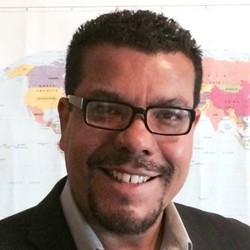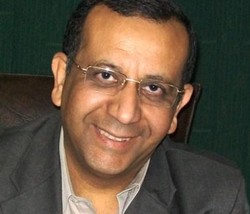The Rev. Juan Sarmiento, international evangelism catalyst for Presbyterian World Mission, heard God calling him to Christian service as a teenager in Caracas, Venezuela.
“I was invited to attend a Presbyterian-sponsored group that prayed for people in remote areas, such as the Amazon, Africa, Asia and the Middle East,” Sarmiento says. “It was there I came to realize that God wanted me to dedicate my life to sharing the gospel beyond my own culture.”
Looking back at nearly 180 years of mission around the world, the Presbyterian Church (U.S.A.) recognizes that the most solid and sustained growth of the church has been in places where training of leaders in holistic evangelism has been emphasized, according to Sarmiento. He illustrates the goal of the church’s international evangelism efforts using the acronym DEEP.
Developing 2,000 leaders around the world by 2017 to do
Evangelism in community transforming ways
Empowered by a Reformed contextual theology in
Partnership with over 70 sister denominations and schools
Sarmiento and Atef Gendy, president of the Evangelical Theological Seminary in Cairo, are co-leading a workshop titled “Lessons from Egypt” at Big Tent. The event is being held July 30-Aug. 1 on the University of Tennessee campus in Knoxville. The workshop will be offered twice: Friday, July 31 at 1:30pm and Aug. 1 at 9:45am.
“It is fitting that our workshop focuses on the work of the church in Egypt,” Sarmiento says. “That’s where our missionaries started the first seminary in the country—on a boat!”
The revolutionary events that began in Egypt on January 25, 2011, brought rapid and deep change to society and previously accepted norms. The country now has a new constitution, a new government, and unprecedented openness to the church’s role in society. The Evangelical Presbyterian Church in Egypt (EPCE)—the largest Protestant church in the Middle East and the church Presbyterian missionaries planted over 150 years ago—is seizing this opportunity by actively reaching out to communities and meeting people’s needs.

Juan Sarmiento
“Today they have about 1,100 congregations and around half a million members,” Sarmiento says.
More than any other institution in the Middle East, the Evangelical Theological Seminary in Cairo (ETSC) has trained pastors for churches from Libya to Syria to Iraq. Its graduates serve in a variety of ministries throughout the Arab World. ETSC is well positioned to increase its impact in the region—opening satellite campuses and developing online course work in the Arabic language, reaching into nations and communities that an American missionary could never enter.
The “Training Leaders for Community Transformation: Lessons from Egypt” workshop at Big Tent will explore how training transformational leaders may reenergize congregational and community outreach efforts.
Sarmiento answered a few questions about PC(USA)’s critical global initiative to train leaders:
Describe the need for transformational leaders nationally and internationally?
The need is great. In the US, the ratio is one teaching elder for every 130 members. Globally the need is more than ten times greater: one teaching elder for every 1,500 members. (Source: Office of the General Assembly’s 2013 Statistical Summary and the Center for the Study of Global Christianity)
PC(USA) partners in Malawi report that there is only one ordained pastor for every 7,000 church members, with much of the administrative and pastoral work being done by elders and deacons. (Source: Debbie Braaksma, Africa area coordinator, Presbyterian World Mission)
The Evangelical Presbyterian Church of Egypt reports that of their 375 churches, 72 are without pastors. Additionally, the Synod of the Nile supervises 90 other fellowship communities that have no pastors. (Source: The Evangelical Church – Synod of the Nile in Council of Pastoral and Outreach Ministries, November 2014)
Every day around the world 174,000 people become Christians and 130 new congregations get started, but there are not enough trained women and men to lead them. (Source: Train Leaders International)
What is the goal of the “Train Leaders for Community Transformation” campaign?
The campaign’s goal is twofold:
- To train 1,800 women and men to non-ordained pastoral service with PC(USA) global partners by December 31, 2016.
- To train 200 pastors, pastoral candidates, missionaries (or missiologists) with PC(USA) global partners by December 31, 2017.
When you say “train” leaders? What does this training entail?
The training will vary depending on the realities of the countries where the leaders are serving but, in general, we are promoting courses and programs that emphasize sharing the good news in word and deed according to our Presbyterian identity, the holistic growth of existing congregations and the establishment of new ones. At the same time, we are working toward the development of other competencies needed in each situation such as agriculture, literacy training, health, or teaching, digital technology, matters of peace and justice, cross-cultural communication as well as ecumenical and interreligious relations.
What is the progress to date toward reaching the goals for training new leaders?
Thanks to the hard work of our mission co-workers in collaboration with the church outside the U.S., we are above our numerical projections and should be able to train more leaders than anticipated. What I would like to focus on now is providing opportunities for us in the U.S. to be exposed to the ways in which church leaders in other countries are being trained, so that we can do a better job at reaching out to our communities. The workshop with Professor Gendy will focus precisely on that.
Thinking globally, what are the top countries in greatest need of well-trained church leaders?
There are many. There is certainly a great need for leaders in Sub-Saharan Africa, where Christianity has grown faster than anywhere else over the last century. Another is Cuba, where our partners also have been growing at a very rapid pace in the last decade. In the next few months, we will be sending the first mission co-worker since the revolution to serve as a seminary professor.
Egypt itself is another location, since the church in Egypt has a very ambitious plan of starting new churches for which pastors will be needed. More than 70 percent of Christian Egyptians do not have access to a church.
Another country is Indonesia, where we are emphasizing the training of leaders who can relate to the majority Muslim community in ways that are reflective of Christ’s love.
What is the greatest challenge to overcome in training leaders?
I think the greatest challenge is that, as Christian leaders in the west, we tend to focus more on success than in succession. Failing to see beyond the individual longevity of our ministry seriously affects the legacy that we leave for the future of the church in the world. We need to promote an equipping culture at all levels of the life of the church in order to release God’s people to be agents of Christ’s peace and justice in the power of the Spirit both in our communities and around the world. Because very few of us fail to see how, in the Presbyterian Planning Calendar, “Theological Education Sunday,” which falls on September 20 this year, is right before “Evangelism Sunday.” These two need to be very closely interrelated.
In Egypt specifically, what progress is being made?
The Evangelical Presbyterian Church of Egypt’s congregations, presbyteries and councils currently oversee more than 66 new church developments in new cities throughout the country, as well as villages and remote areas. In recent years, the government of Egypt has given land to our partner church for the building of 14 new church facilities and significantly eased the process to obtain building permits. This is unprecedented in the history of Egypt since the Arab Islamic conquest in the seventh century.
Church leaders see this as a God-given opportunity, an opening window to establish many new churches where none exists. But the window may not be open for long. Thus our partner church has issued us a Macedonian call: “Come over … and help us!” (Acts 16:9). For legal, security, as well as cultural reasons, a worshiping community cannot meet or function outside of a church building in Egypt. Thus, it is not possible for a congregation to exist without a building specifically designated for a church.
How will we know when we have reached our goals for training leaders?
We will produce and share a celebration video with testimonials from some of the leaders trained, the trainers and other key participants in the campaign. Also watch for a book with stories that we will be making available.
-----
Atef Gendy, president and professor of New Testament at Evangelical Theological Seminary in Cairo (ETSC), earned his PhD from the University of Aberdeen, Scotland. Previously he served as director of a training center in the south of Egypt to help equip lay leaders for the ministry. He grew up in Assyout in a Christian (Presbyterian) family and is an elder at his church.
The Rev. Juan Sarmiento, International Evangelism Catalyst, Presbyterian World Mission, helped launch the first evangelical organization to serve the needs of individuals who are HIV-positive in Brazil. He was a community organizer with the Hollywood-Wilshire cluster of Presbyterian churches in Los Angeles, and assisted new immigrants by founding a nonprofit organization in the San Fernando Valley. Sarmiento is currently focused on the Presbyterian Church’s critical global initiative to Train Leaders for Community Transformation.

